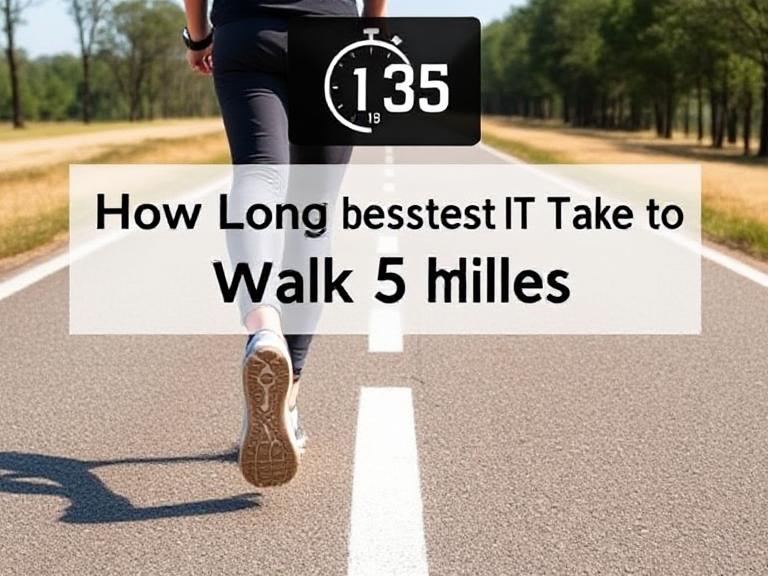Walking is one of the simplest and most effective forms of exercise. Whether you’re walking for fitness, leisure, or commuting, knowing how long it takes to walk a specific distance can help you plan your day better. One common question is: “How long does it take to walk 5 miles?”
The answer depends on several factors, including walking speed, terrain, fitness level, and breaks. In this article, we’ll explore these factors in detail and provide a clear estimate of the time required to walk 5 miles.
Table of Contents
Factors That Affect Walking Time
1. Walking Speed
The average walking speed for most adults is 3 to 4 miles per hour (mph). However, this can vary based on age, fitness, and stride length.
- Leisurely walk (2.5 mph): 2 hours
- Average pace (3 mph): 1 hour 40 minutes
- Brisk walk (3.5 mph): 1 hour 25 minutes
- Fast walk (4 mph): 1 hour 15 minutes
Athletes or power walkers may cover 5 miles even faster, sometimes in under an hour.
2. Terrain and Elevation
Walking on flat, smooth surfaces like sidewalks or treadmills is easier than hiking on uneven trails or steep hills.
- Flat ground: Faster pace (3-4 mph)
- Hilly or rough terrain: Slower pace (2-3 mph)
3. Fitness Level and Age
Fitter individuals tend to walk faster, while older adults or those with mobility issues may take longer.
4. Rest Breaks and Stops
If you take breaks, the total time will increase. A 5-mile walk with short pauses could add 10-20 minutes.
5. Weather Conditions
Wind, rain, or extreme heat can slow you down, while cool, calm weather may help maintain a steady pace.
Estimated Time to Walk 5 Miles
Based on average walking speeds:
| Walking Pace | Time for 5 Miles |
|---|---|
| Slow (2.5 mph) | 2 hours |
| Moderate (3 mph) | 1 hour 40 minutes |
| Brisk (3.5 mph) | 1 hour 25 minutes |
| Fast (4 mph) | 1 hour 15 minutes |
These estimates assume continuous walking without breaks. Adjust accordingly if you stop or slow down.
Benefits of Walking 5 Miles a Day
Walking 5 miles daily has numerous health benefits:
- Weight Management: Burns 300-600 calories, aiding weight loss.
- Cardiovascular Health: Strengthens the heart and improves circulation.
- Mental Well-being: Reduces stress and boosts mood through endorphin release.
- Joint and Muscle Health: Low-impact exercise that strengthens bones and muscles.
- Improved Stamina: Increases endurance over time.
Tips for Walking 5 Miles Efficiently
- Wear Comfortable Shoes – Supportive footwear prevents blisters and fatigue.
- Maintain Good Posture – Keep your back straight and swing your arms naturally.
- Stay Hydrated – Bring water, especially in hot weather.
- Warm Up and Cool Down – Stretch before and after to avoid muscle strain.
- Use a Pedometer or App – Track distance, time, and pace for motivation.
FAQs About Walking 5 Miles
1. Can beginners walk 5 miles?
Yes, but it’s best to start with shorter distances and gradually increase. Beginners may take 2+ hours at a slow pace.
2. How many steps are in 5 miles?
On average, 5 miles equals 10,000-12,500 steps, depending on stride length.
3. Is walking 5 miles a day good for weight loss?
Yes, combined with a healthy diet, walking 5 miles can help burn calories and support weight loss.
4. How many calories are burned walking 5 miles?
Approximately 300-600 calories, depending on weight and speed.
5. Should I walk 5 miles every day?
It’s safe for most people, but listen to your body. Rest days can prevent overuse injuries.
6. What’s the best time of day to walk?
Morning walks boost energy, while evening walks can help with relaxation. Choose what fits your schedule.
7. How can I increase my walking speed?
Practice brisk walking, improve posture, and incorporate interval training (alternating fast and slow paces).
Conclusion
The time it takes to walk 5 miles varies based on speed, terrain, and personal fitness. On average, it takes 1 hour 15 minutes to 2 hours at a steady pace. Whether you’re walking for exercise, commuting, or leisure, understanding these factors helps you plan effectively.
Start with a comfortable pace, track your progress, and enjoy the physical and mental benefits of walking. With consistency, you may find yourself covering 5 miles faster and more effortlessly over time!

